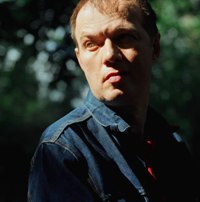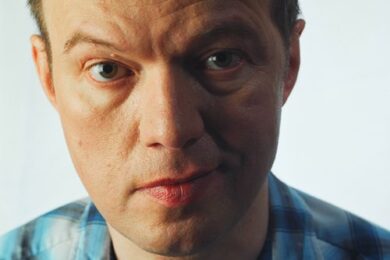It’s time again for the quadrennial orgy of pointless nationalism that turns us all into unwilling experts in arcane sports like kayaking, trampolining and wellie throwing. As the Olympics open in Beijing to wild public apathy and a new range of crispy spring rolls at McDonald’s, I can finally ask Edwyn Collins whether Orange Juice’s instrumentals ‘Moscow Olympics’ and its close relative ‘Moscow’, the B-sides of their 1980 debut single ‘Falling and Laughing’, were intended for Olympic use?
“We really did mean it as a possible sports theme tune,” he confesses, “But you have to remember that it was written by James Kirk, who was quite mad.” Kirk, the band’s original guitarist, gave up music for chiropody (possibly apocryphally) before unexpectedly releasing a solo album a few years back. (It sounded like the work of a chiropodist who used to be in Orange Juice, and wasn’t bad at all).
As everyone knows, in February 2005 Collins suffered two brain haemorrhages and very nearly died. (He contracted MRSA while in intensive care, to compound matters). His long recovery has been well-documented, but remarkably he’s performing again and not merely carried by the audience’s affection. Last year’s excellent Home Again was very nearly a posthumous release. But let’s not kid ourselves. Edwyn won’t be running the London Marathon for aphasia charities for a while yet. His speech is still slow and he walks with difficulty, his right side still partialy paralysed (which also prevents him from playing guitar).
But he sings better than ever, sat at the front of his unlikely indie supergroup, including guitarists Roddy Frame of Aztec Camera fame and Andy Hackett, once a Rockingbird, now a Denmark Street legend who’ll sell you an axe anytime.
Collins and Frame go way back. “We met when he was 16 and I was 20,” says Collins, “Roddy really is a fantastic musician, he always was.”
“Thank you Edwyn,” blushes Frame.
“It’s a pleasure,” says Collins, starting to laugh as the pair begin to resemble a pair of genteel duffers.
“I made a demo tape and sent it to everyone,” recalls Frame, “Rough Trade, Factory- they all turned us down. But not to Postcard, because we read an interview with [label boss] Alan Horne and he was a horrible man.” Collins lets loose his famous hyugh-hyugh, a laugh as inimitable as Shame MacGowan’s emphysemic snort. “Then I met Edwyn. Him and Horne came down to see us at the Bungalow Bar in Paisley. The rest is history.”

It’s difficult now to overstate the impact that the wilfully eccentric Orange Juice had on the gloom-ridden post-punk scene. They didn’t wear overcoats, they wore puttees. They didn’t reference the Doors and Bowie, they referenced the Lovin’ Spoonful and Creedence Clearwater Revival and Al Green. They even released a charmingly ineffectual cover of the Reverend’s ‘L.O.V.E.’ as their major label debut, a rather, er, audacious move.
“What was I thinking?” says Edwyn, shaking his head “I must have been drunk.”
At the time Al Green was seriously undervalued. This was a couple of years before Tina Turner did what Ike used to do to Tina to ‘Let’s Stay Together’.
Even in their home town of Glasgow, they were exotic.
“When I first saw a photo of Orange Juice in a local fanzine I thought they were American. They looked like they could be Jonathan Richman’s band. I was definitely influenced by Edwyn and not just in the music,” says Frame, a still wiry figure who vaguely resembles cycling legend Lance Armstrong.
“Edwyn, you were the only person I knew who played acoustic or even semi-acoustic guitars, and used augmented and diminished chords and all that,” he continues, “It was weird that I was writing stuff like ‘We Could Send Letters’ and ‘Just Like Gold’- romantic songs before having even heard you.”
Collins’s romantic side was always leavened with wildly sardonic humour as opposed to the youthful Frame’s desire to will love into being. From early songs like the bleakly funny ‘Consolation Prize’ to Orange Juice’s biggest single ‘Rip It Up’ and The Hit itself, ‘A Girl Like You’, he often seemed incapable of taking the concept of romantic love seriously. But as long as someone’s buying, who cares. Not only did ‘Rip It Up’ give Simon Reynolds’s history of post-punk music a title, it influenced a more unlikely figure.
“And it’s in Tony Blackburn’s autobiography. At one point he says he had to ‘rip it up and start again’,” says Edwyn clearly tickled.

For all their influence, Orange Juice were soon outjangled by the more visceral Smiths (and how often does anyone say that?). Collins launched an erratic solo career and watched others, from the Bluebells to Wet Wet Wet, rework his styles with greater success. (At his first London headline show he was silenced when, after asking the crowd if they had any requests, a sharp heckler yelled ‘Young At Heart’)
It took years for The Hit to come along? Is it really possible to live off The Hit?
“Oh yeah, if it sells enough copies. ‘A Girl Like You’ did one, two million copies all round the world,” claims Edwyn.
Is it a millstone or a milestone in your career?
“I love it. Why wouldn’t I? If only I could write another.” He pauses. “Or several more.”
Even now it sounds like all things to all men, and women. Collins might have been acidly prescient when he sang ‘Too many protest singers, not enough protest songs’, but out in the big world babies were conceived to his tune. On YouTube a fan (of both sado-masochism and Edwyn Collins, presumably) has married the tune to clips from the Maggie Gyllenhaal/James Spader spankfest Secretary.
The same year he released the perfectly cynical ‘The Campaign for Real Rock’, with its coda ‘Yes yes yes, it’s the summer festival, the truly detestable summer festival’. I saw you play that in the most packed tent I’ve ever endured (and that includes eight of us in a two man at Glasto) at the barely lamented Phoenix. Do you still have it in for weekends in the countryside?
“I do love Glastonbury,” he concedes. Edwyn stormed it this summer. “What’s his name? Michael-” Everyone present waits before yelping ‘Eavis’. “Eavis! Now is he a hippie or a farmer?” A question he surely asks himself every day of his life.
Speaking to Edwyn is not your average Q and A. Although the world deserves to see his extraordinary, and oft overlooked 1997 sitcom West Heath Yard, where a stellar array of talent from Paul Cook to Natalie Imbruglia queued up to lose what dignity the music biz had left them with, it’ll have to make do with the web clip of the heartbreaking faux-soul duet ‘Lasagne Just For One’. Director Martin Perry is apparently the man who holds the key to this lost gem, so painfully accurate in its dissection of the music industry that many took it for a documentary.
Edwyn has other things on his mind, like dealing with his aphasia, “Which means that I just can’t recall things.” For a man so sharp, always having things on the tip of his tongue, so to speak, must be particularly frustrating. Yet there’s an air of ageing gracefully about the whole set-up. Asked how things have changed Andy Hackett sounds wistful. “Well for a start Edwyn doesn’t get so pissed before each show. None of us do anymore.”
The gallows humour of musicians is revealed as he continues. “Edwyn always claims that this was the best thing that could have happened to his career.” He looks doubtful. “When you remember the condition he was in only eighteen months or two years ago, it’s unbelievable.”
Later on Collins, Frame and Hackett perform a short set at the 12 Bar. The guitarists are terrific. ‘Falling and Laughing’ has never sounded smoother. ‘What Presence’, even set adrift from the dub moorings of the recorded version, is great. And ‘Home Again’ is the tearjerker it was always intended as, now with added poignancy. His indefatigable wife Grace is writing a book about their experiences (tentatively called Falling and Laughing – and whose idea was that?), so this story remains ongoing. But as music therapy goes, it’s truly enjoyable.
www.ukconnect.org explains the condition of aphasia rather better than I can, and is actively supported by the Collins family and friends.



